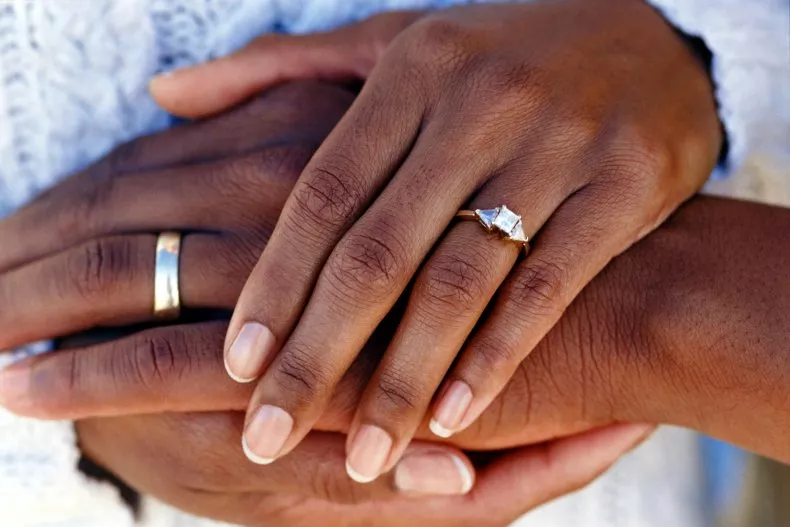Relationship
Why do you want to get married? – Part 2

A ring is a token of your faith and love to each other
In our journey to understanding the motives behind the union of marriage, we addressed the conscious and unconscious reasons people often say ‘I do’.
In Part 1, we explored the pressures of aging (I am growing old; therefore, I have to marry) and societal expectations (My family, friends and society are putting pressure on me to marry).
In Part 2, we delve into the influence of peer pressure and the desire to wear a wedding ring. Whether you have been following the series or are just joining us, let us continue exploring the reasons some people get married. These include (stated in their own words):
3. My friends are all marrying; I’m the only one who is not yet married
I can understand how you feel, especially if you are a woman. As a single woman (or man), you may have difficulties attending social events alone without a spouse or would-be spouse (especially weddings, marriage anniversaries, and baby naming ceremonies).
Most of these feelings connected to those social events range from loneliness to embarrassment, and to anger. You feel uncomfortable that you have to go to yet another couples-centered event all alone.
I know that these feelings can make you have all kinds of unhealthy thoughts about your self-esteem, self-value and even future prospects.
Nevertheless, going ahead to marry anyone at all simply because of “my friends are all marrying; I am the only one who is not yet married” thoughts and feelings, can be quite dangerous.
I know you will want to know what you should do if you feel that way. Well, I can give you a few coping strategies. These strategies include:
a. You do not have to attend all your friends’ weddings.
It is not compulsory or mandatory for you to attend every wedding that is organised. As a coping strategy, you can be very selective of the weddings you choose to attend.
In such cases, you can show your love and support to such friends ahead of the event day by genuinely wishing them well, giving them some form of financial or material support, and communicating how much you care about them getting married.
When these are done ahead of time and are well communicated, your friends will understand and greatly appreciate your efforts.
b. If you decide to attend the event, then be quick to challenge any automatic negative thoughts about yourself.
It is a fact that many of us are highly critical of ourselves. If you have any automatic negative thoughts, such as—“I am always going to be alone”, “I will never find someone who loves me”, “I am nobody”, “life is not treating me well”, and “I am such a loser”—then pause.
Stop yourself and stop those negative thoughts by: I. always being quick to identify the negative thoughts, II. challenging them, and III. replacing those negative thoughts with alternative healthy thoughts. Re-frame your thoughts to be more positive and helpful to your own happiness.
4. I need to wear a wedding ring too
There is nothing wrong with wearing a wedding ring and probably enjoying a little glamour that comes with marriage ceremonies.
Except if you fantasise that being married with wedding ring on finger automatically implies happiness and fulfillment in life; then you may be greatly mistaken and in for a shock.
Sometimes the thought of “I need to wear a wedding ring too” is a little more subtle for a lot of unmarried people.
For some people, they see marriage as a status symbol, so they get married thinking they will parade around town with their spouse and people will bow in their presence like they just conquered an entire empire, city or something.
Unfortunately, these are only fantasies; they are not the reality. Do not forget that for some people, wearing a wedding ring has come to represent a shackle of bondage because of the many domestic abuses they suffered as a result of getting married.
Meanwhile, a ring is a very precious thing—a token of your faith and your love to each other. It is a never ending circle that indicates the continuing love of God—a love that never fails and never presents itself selfish or puffed up.
Therefore, my hope and prayer for you is that as you give yourself wholly to the wisdom and practicality of these articles, as well as the Bible and pre-marital counselling— the wearing of your wedding ring will come to represent something more lasting!
To be continued …
Source: Excerpts from ‘Preparing for a Happy and Fulfilling Marriage’ Book by REV. COUNSELOR PRINCE OFFEI (Psychotherapist and Marriage Therapist).
Relationship
The importance of emotional intelligence in relationship and marriage

AS a marriage counsellor and published author of marriage books, I have seen firsthand the profound impact emotional intelligence can have on relationships and marriages. Emotional intelligence is the ability to recognise and understand emotions in yourself and others, and to use this awareness to guide thought and behaviour. In the context of relationships and marriage, emotional intelligence is a game-changer.
Emotional intelligence involves being aware of your emotions, managing them effectively, and using empathy to understand your partner’s feelings. It is about being attuned to the emotional nuances of your relationship and responding in ways that foster connection, trust, and intimacy.
In relationships and marriage, emotional intelligence helps partners navigate conflicts, communicate effectively, and build a deeper connection. When both partners have high emotional intelligence, they are better equipped to manage stress, resolve conflicts, and show empathy and understanding towards each other.
Benefits of emotional intelligence in relationships
1. Better communication
Emotional intelligence helps partners communicate their needs, feelings, and concerns more effectively.
2. Conflict resolution
Emotionally intelligent partners can manage conflicts in a more constructive and respectful way.
3. Deeper connection
Emotional intelligence fosters empathy, understanding, and intimacy in relationships.
4. Increased trust
When partners understand and manage their emotions effectively, they build trust and stability in their relationship.
Practical tips for building emotional intelligence in relationships
1. Practice self-awareness
Understand your emotions and how they impact your interactions with your partner.
2. Develop empathy
Make an effort to understand your partner’s feelings and perspective.
3. Communicate effectively
Use emotional intelligence to guide your communication and conflict resolution.
4. Manage stress together
Support each other in managing stress and emotions.
By focusing on emotional intelligence, couples can create a more loving, supportive, and enduring relationship.
To be continued …
Source: Excerpts from “COURTSHIP MATTERS: Keys to a Fulfilling LastinMarriage” Book by REV. COUNSELOR PRINCE OFFEI (Lecturer, Published Author, and Marriage Counsellor).
ORDER BOOK NOW:
https://princeoffei22.wixsite.com/ author https://princeoffei22.wixsite.com/website
COUNSELOR PRINCE & ASSOCIATES CONSULT (CPAC COUNSELLOR TRAINING INSTITUTE)
By Counselor Prince Offei
Relationship
Not all snoring is created equal

When people are unable to differentiate between your snore and a locomotive engine or a trumpet that could break down walls, it may not just be a nuisance to your bed and housemates, but it may signal a serious medical condition.
Loud snoring may be a warning that you have Sleep Apnoea, a condition that opens doors to several serious life-threatening complications.
Not every snoring is associated with sleep apnoea and also there may be sleep apnoea without snoring.
Sleep Medicine is no luxury, we need to do everything possible to get good quality sleep, especially when sleep is one of the greatest legal performance enhancing ‘drugs’ known to man.
In sleep apnoea, breathing repeatedly stops and starts during sleep. It may be as often as 30 times in an hour. This shortchanges our brain of oxygen, and it is a potentially dangerous sleep disorder.
Types of Sleep Apnoea;
• Obstructive Sleep Apnoea (OSA)
o The commonest by far. Throat muscles relax and block flow of air
• Central Sleep Apnoea
o Brain does not send proper signals to muscles controlling breathing
• Complex Sleep Apnoea
What may signal Sleep Apnoea/ What to look out for
• Loud snoring
• Episodes in which you stop breathing during sleep — which would be reported by another person
• Gasping for air during sleep
• Awakening with a dry mouth
• Morning headache
• Difficulty staying asleep, known as insomnia
• Excessive daytime sleepiness, known as hypersomnia
• Difficulty paying attention while awake
• Irritability
• You may just not be able to complete a movie?
• Involved in minor accidents at home, work or even on the road?
Get checked out. Even children may suffer from sleep apnoea.
What increases our chance of developing Sleep Apnoe?
• Excess weight or fat.
• Neck circumference. People with thicker necks might have narrower airways.
• A narrowed airway. Tonsils or adenoids also can enlarge and block the airway, particularly in children.
• Being male. Men are two to three times more likely to have sleep apnea than women. However, women increase their risk if they’re overweight or if they’ve gone through menopause.
• Being older. Sleep apnea occurs significantly more often in older adults.
• Family history. Having family members with sleep apnea might increase your risk.
• Use of alcohol, sedatives or tranquilisers.
• Smoking. Smokers are three times more likely to have obstructive sleep apnoea
• Nasal congestion. If you have trouble breathing through your nose — whether from an anatomical problem or allergies — you’re more likely to develop obstructive sleep apnea.
• Medical conditions. Congestive heart failure, high blood pressure and type 2 diabetes are some of the conditions that may increase the risk of obstructive sleep apnea. Polycystic ovary syndrome, hormonal disorders, prior stroke and chronic lung diseases such as asthma also can increase risk.
What complications may
occur from untreated Sleep
Apnoea
Sleep apnea is a serious medical condition. Complications of OSA can include:
• Daytime fatigue. The repeated awakenings associated with sleep apnea make typical, restorative sleep impossible, in turn making severe daytime drowsiness, fatigue and irritability likely.
You might have trouble concentrating and find yourself falling asleep at work, while watching TV or even when driving. People with sleep apnea have an increased risk of motor vehicle and workplace accidents.
You might also feel quick-tempered, moody or depressed. Children and adolescents with sleep apnea might perform poorly in school or have behaviour problems.
• High blood pressure or heart problems. Sudden drops in blood oxygen levels that occur during OSA increase blood pressure and strain the cardiovascular system. Having OSA increases your risk of high blood pressure.
OSA might also increase your risk of recurrent heart attack, stroke and irregular heartbeats, such as atrial fibrillation. If you have heart disease, multiple episodes of low blood oxygen (hypoxia or hypoxemia) can lead to sudden death from an irregular heartbeat.
• Type 2 diabetes. Having sleep apnea increases your risk of developing insulin resistance and type 2 diabetes.
• Metabolic syndrome. This disorder, which includes high blood pressure, abnormal cholesterol levels, high blood sugar and an increased waist circumference, is linked to a higher risk of heart disease
• Liver & Kidney problems
• Sleep-deprived room or house mates
• Complications during surgery and also with some medication
Lifestyle modifications that may help
• Lose excess fat. Even a slight weight loss might help relieve constriction of your throat. In some cases, sleep apnea can resolve if you return to a healthy weight, but it can recur if you regain weight.
• Exercise. Regular exercise can help ease the symptoms of obstructive sleep apnea even without weight loss.
• Avoid alcohol and certain medicines such as tranquilisers and sleeping pills. These relax the muscles in the back of your throat, interfering with breathing.
• Sleep on your side or abdomen rather than on your back. Sleeping on your belly has many posture related challenges but we may adopt that briefly as we work on definitive treatment.
• Don’t smoke.
Diagnosis and Treatment
There is help so if you think you may have sleep apnoea do not hesitate to speak to your doctor.
A few questions, examination and Sleep Studies and a diagnoses may be reached and the appropriate treatment, advice or support systems put in place.
Yes, the options vary from just lifestyle modifications to the famous CPAP, implants and even surgery BUT do seek help, not only will you feel brand-new when the condition is resolved, you may be saving relationships.
……definitely not all snoring is created equal. Find out about yours.
AS ALWAYS LAUGH OFTEN, ENSURE HYGIENE, WALK AND PRAY EVERYDAY AND REMEMBER IT’S A PRICELESS GIFT TO KNOW YOUR NUMBERS (blood sugar, blood pressure, blood cholesterol, BMI)
Dr. Kojo Cobba Essel
Health Essentials Ltd (HE&W Group)
(dressel@healthessentialsgh.com)
*Dr. Essel is a Medical Doctor with a keen interest in Lifestyle Medicine, He holds an MBA and is an ISSA Specialist in Exercise Therapy, Fitness Nutrition and Corrective Exercise. He is the author of the award-winning book, ‘Unravelling The Essentials of Health & Wealth.’
Thought for the week (1) – “I am hard pressed to choose the greatest legal performance enhancing drug. Is it good quality Sleep or Exercise?”
By Dr. Kojo Cobba Essel






